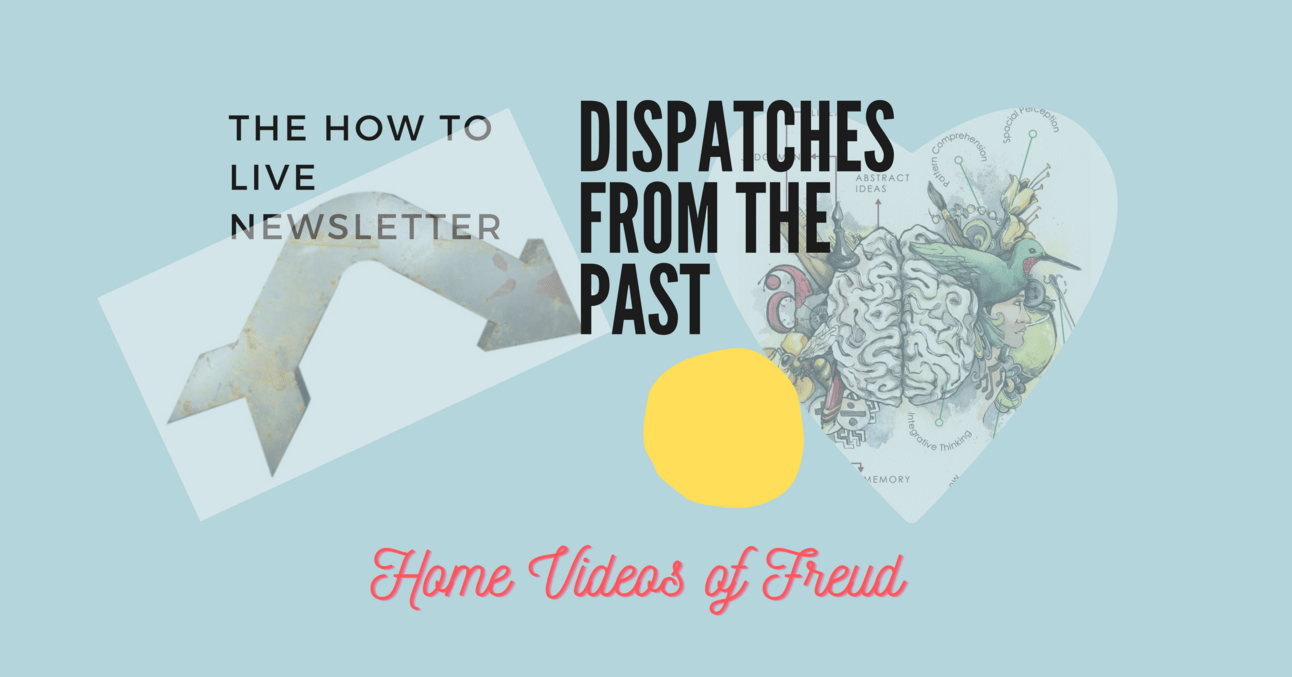Hi {{ First Name | friend }}!
TL;DR is a monthly digest summarizing the vital bits from the previous month's "How to Live" newsletter so you don't miss a thing.

AUGUST 2024
Every Wednesday I offer a free, highly-comprehensive, hopefully helpful, psychological map to help make your life easier.
The How to Live Newsletter is my life and my livelihood; if you find what I do meaningful and valuable, if it’s helped you in any way, and you have the means to give back please consider supporting this work by upgrading or donating today.
Thank you for being a loyal subscriber. 🙏
Say HELLO to the new logo! Made by Cam Vokey.

WHAT DO YOU THINK?
August 7th, 2024 Was a Dispatch From the Past about Philippe Petit, Educational Films from the 1950s, and Home Videos of Freud.
Fifty years ago this morning, a 24 year old French high-wire artist named Philippe Petit walked three-quarters of a mile across a tight rope, 1350 feet over the sidewalks of NYC.
No net.
He spent 45 minutes walking and playing, across the sky, waving to the weather, to the birds. He laid down and breathed it all in.
Never say the dentist’s office doesn’t inspire feats of imagination, because it was there, in the waiting room he saw the 1968 drawing of the proposed twin towers, and an idea took shape.
If I see two towers, I have to walk.
August 14th, 2024 Piece Asked Are You Really Free? The Silent Struggle That Might Be Holding You Back.
Childhood Separation Anxiety is a standard and expected developmental stage. In The Diagnostic and Statistical Manual of Mental Disorders (DSM)—the handbook of criteria that clinicians use to diagnose mental health disorders and establish a consistent and common language—it’s marked by a loose start and end date: appearing around age 1 and disappearing around the age of 3.
If it doesn’t disappear by age 3, and lasts for longer than 4 weeks, it’s considered a disorder, which should then be treated.
But what happens if it doesn’t disappear and is never treated?
What happens if it stays with you your entire life?
Or maybe it does end, but then it returns when you’re 23.
Until the early-aughts, Adult Separation Anxiety Disorder (ASAD) didn’t exist; it was a diagnostic orphan, existing in a liminal space between patient testimonials and clinical reality.
But, in 2015, the DSM dropped the age criterion for Separation Anxiety et Voila, millions of silent sufferers found themselves visible.
Yet, despite being a “new field of study” it is not, in fact, only nine years old.
It’s as old as time; it’s simply under-recognized, leaving countless adults to remain undiagnosed and untreated; to suffer silently. ASAD significantly impacts a person’s quality of life, relationships, educational achievements, career prospects and life goals.
I have it.
You might have it too.
August 21, 2024 Was a Piece About Why Saying I Love You is Not Enough
Never telling anyone what they mean to you will haunt you when that person isn’t there any more.
A relationship expands when we nourish it, and it collapses when we deprive it. We take “I love you” for granted, often expecting it to do the work we’re not doing.
What (I love you) is valuable; of course, it is. But why holds the what of love aloft, enriching and deepening one's experience of themselves in relationship to another.
Not once do we get to experience ourselves in the third person.
We’ll never know what we look like walking toward a loved one; we can’t know the energy others absorb being around us. We can guess. We can assume.
But being told by someone we love, why we’re lovable, helps prop up and fill out our identity, adding dimension to our lived experience of being a self.
Being a human is often a lonely business.
The world around us filters through one lens; we rely on a single mind our entire lives; we look out from behind the same half-inch wide windows; we are stuck inside one body; our gestures always mediated through the same intrinsic set of idiosyncrasies, and no matter how much we long to look or act or talk or sing or be like someone else, we will never be anyone but ourselves.
What (I love you) is valuable; of course, it is. But why holds the what of love aloft, enriching and deepening one's experience of themselves.
What enriches our monologic experience of being a single human being is learning how we impact others, hearing the myriad ways our humanity sings itself into another’s.
When we tell our friends and loved ones how they impact us and why, we open up portals inside them they never realized existed, which stretches both our worlds.
August 25th, Was a Bonus Piece for Paying Members About My Personal Struggles with Adult Separation Anxiety Disorder.
Today's bonus for premium members is the most personal How to Live piece I've written. Not because I am typically withholding—I’m not—but because I’m exposing a struggle that, until a decade ago, wasn’t clinically recognized in adults, leading sufferers to struggle with feelings of shame and discomposure for existing outside the realm of other peoples’ possibilities.
Yet, adult separation anxiety disorder isn't just possible, it's prevalent.
This piece is about adult separation anxiety as I experience it still, to this day, although to a lesser degree than I did in childhood.
I reveal the impact it has on my friendships and romantic relationships and how it makes things most people take for granted incredibly challenging for me.
On August 28th, 2024, I Wrote About Brainspotting, in Where You Look Affects How You Feel.
Today’s piece is about a therapeutic technique called “Brainspotting (BSP),” a modernized version of Eye Movement Desensitization Reprocessing (EMDR).
In 1993, David Grand was a young psychologist in training, learning EMDR from Francine Shapiro.
He found the method exciting and effective. When he learned Somatic Experiencing Therapy in 1999, he decided to integrate psychoanalysis, somatic experiencing, and EMDR, using eye movements of varying speeds and directions, healing sounds, and different tactile innovations. He called this Natural Flow EMDR.
But the events of 9/11 took Dr. Grand’s work in a new direction, leading to his eventual discovery of what he would call Brainspotting (BSP). Working with first responders, family members, and survivors forced him to relive the experience over and over again, allowing him to stumble upon a much more targeted approach to trauma.
Because Dr. Grand was constantly tuned in to the heightened state of his clients, he consciously and unconsciously absorbed their cues, anticipating what was coming before it occurred.
This attunement created the opening he needed to discover the power of Brainspotting.
And, if you’re into this kind of a thing…
(Full Disclosure: these “partnerships” are my attempt to get paid for the absolutely astronomical amount of labor I put into this newsletter, every week. I get paid only when people click on the link. Last month I made $12.)
Most of you do not donate, and haven’t upgraded, and so, I ask you please to show your appreciation for the work I do, by clicking on the partnership links. 🙏 ❤️
This cannabis startup pioneered “rapid onset” gummies
Most people prefer to smoke cannabis but that isn’t an option if you’re at work or in public.
That’s why we were so excited when we found out about Mood’s new Rapid Onset THC Gummies. They can take effect in as little as 5 minutes without the need for a lighter, lingering smells or any coughing.
Nobody will ever know you’re enjoying some THC.
We recommend you try them out because they offer a 100% money-back guarantee. And for a limited time, you can receive 20% off with code FIRST20.
If you like this newsletter, please send to others who might also enjoy it. If someone sent this to you, please 👇

Amanda
VITAL INFO:
Nope, I am not a licensed therapist or medical professional. I am simply a person who struggled with undiagnosed mental health issues for over two decades and spent 23 years in therapy learning how to live. Now, I'm sharing the greatest hits of what I learned to spare others from needless suffering.
Most, but not all, links are affiliate, which means I receive a small percentage of the price at no cost to you, which goes straight back into the newsletter.
💋 Don't keep How to Live a secret: Share this newsletter with friends looking for insight.
❤️ New here? Subscribe!
🙋🏻♀️ Email me with questions, comments, or topic ideas! [email protected]
🥲 Not in love? 👇














